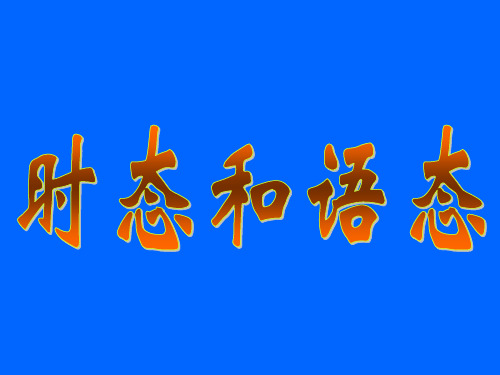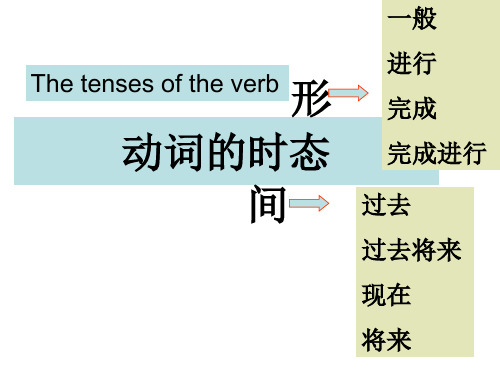英语的时态和语态(PPT)4-4
合集下载
高中英语语法时态和语态课件(共69张PPT)

不能用 be+v-ing, be+v-ing表示将来,主要强调已经 作出的 安排,e.g. i’m pic you up at 6:00,don’t forget. ) ②强调某个意图是事先考虑好的:
--ann is in hospital.
--yes, i know. i’m going to visit her tomorrow.
--oh,really? i didn’t know. i’ll go and visit her. 2〕表示迹象表明要发生某事,则只能用be going to,e.g.
look at the dark clouds.it’s going to rain. 3〕be going to还有以下用法,e.g. ①强调主观想法或意图: i’m going to wash the car if i have time. (注意:此时
②It was then a small fishing village.
2.特别用法:
1〕表客气或委婉的现在:
①I wondered if you were free this evening.
②I thought you might like some flowers.
(注:过去进行时也可表示现在使语气更委婉、客气,eg.① I was wondering if you could give me a lift. ②We were hoping you would stay with us.能这样用的动 词主要限于want, wonder , think, hope, intend等少数 动词。)
②Someone has broken the window.(结果: 窗户仍破 着)
2〕持续性用法:该用法表示一个过去发生的动作在过去 并未在过去完成,而是持续到现在,且可能继续持续下去 或可能到此结束,e.g.
--ann is in hospital.
--yes, i know. i’m going to visit her tomorrow.
--oh,really? i didn’t know. i’ll go and visit her. 2〕表示迹象表明要发生某事,则只能用be going to,e.g.
look at the dark clouds.it’s going to rain. 3〕be going to还有以下用法,e.g. ①强调主观想法或意图: i’m going to wash the car if i have time. (注意:此时
②It was then a small fishing village.
2.特别用法:
1〕表客气或委婉的现在:
①I wondered if you were free this evening.
②I thought you might like some flowers.
(注:过去进行时也可表示现在使语气更委婉、客气,eg.① I was wondering if you could give me a lift. ②We were hoping you would stay with us.能这样用的动 词主要限于want, wonder , think, hope, intend等少数 动词。)
②Someone has broken the window.(结果: 窗户仍破 着)
2〕持续性用法:该用法表示一个过去发生的动作在过去 并未在过去完成,而是持续到现在,且可能继续持续下去 或可能到此结束,e.g.
2021届高三英语一轮复习英语的时态和语态(共123张PPT)

动词
非谓语动 词
不定式
动名词
分词
现在分词 过去分词
语态 时态
主动
一般现在时 v. /v.s
一般过去时 ved
一般将来时 will + v.
过去将来时 would + v.
过去完成时 had + Vp.p
现在完成时 have /has + Vp.p
将来完成时 will have + Vp.p
现在进行时 am /is / are + Ving
一般过去 yesterday, last week, an hour ago, the other day, in 1982, just now
过去进行
this morning, the whole morning, all day, yesterday, from nine to ten last evening… when, while
( using 3 sentences or more,使用实意动词 和系动词, 注意动词形式变化)
一、一般现在时
一直以来的习惯动作;目前状态;规律
一般现在时
单三人称:动词 s或es 非单三人称:动词原形
动词第三人称单数的变化规则
1、直接在动词后+s
like- likes
play-plays
2、以s, x, sh, ch, 接尾的动词:+es
9种时态的构成形式:都是靠动词本身的形式变化或借助助动词 实现。
动词原形和第三人称单数形式(do,does)都属于现在式,可 以表现在这种时间,过去式(did)表过去,但是动词没有将来 式,所以只能靠助动词will帮忙,will do表将来。
【高考】语法动词的态与语态ppt课件

He looks upset. Do you know why? 他看起来很沮丧。你知道原因吗?
2. 表示客观存在及普遍真理。
综合演练
3. 表示现在经常和习惯性发生的动作,常与 sometimes, often, usually, always, every...等时间状语连用。 4. 一般现在时表将来的动作 (1)在由 when, after, before, as, as soon as, although, if, even if, in case, till, until, unless, as long as, where, whatever, wherever 等引导的时间、条件或让 步状语从句中常用一般现在时表将来。
I haven't eaten anything since breakfast. 我从早餐后到现在一直没有吃东西。
综合演练
3. 现在完成时用于固定句型中 (1)It/This/That is+the first/second/...time that+现在完成时. (2)This/That/It is the+形容词最高级+名词(+that)+现在完成时.
He has died for two years.(错误) He has been dead for two years.(正确)
综合演练
(2)现在完成时与一般过去时的区别 现在完成时强调过去的动作对现在的影响和结果;一般过去时只是对过去 动作的叙述,与现在没有关系。
He hasn't turned off the light yet. 他还没有关灯。(灯还亮着)
I have been calling him many times this morning, but there's no answer. 今天早晨我给他打了很多电话,但是没人接。
英语十六种时态ppt课件

He went swimming yesterday. 昨天他去游泳了。 He was ill yesterday. 他昨天病了。
6
2.一般过去时的肯定、疑问、否定三种形式
肯定式
疑问式
否定式
I worked.
Did I work?
I did not work.
He (She, It)worked. Did he (she, it) work? He (She, It) did not work.
13
范围扩展
1. 用过去进行时表示现在主要是为了使语气委婉、客气。 I was wondering if you can give me a lift. 我不知你能否让我搭一下车。 (一般过去时也有类似用法,但比较而言,用过去进
行时显得更客气,更加不肯定。)
2.动词be的过去进行时也可表示过去一时的表现或暂时的 状态。
现在进行时表示说话时正在进行的动作或表示目前一段时 间内正在进行的活动,与现在进行时连用的时间状语有now, these days等。
—What is your mother doing now? 你的妈妈正在干什么? —She is cooking for us. 她正在为我们做饭。 2.现在进行时的具体用法
10
用法
例句
(1) 说话瞬间正在发生的动作,常见的时间 They are watching TV now.
状语有now,at the moment等。如果句首有 他们现在正在看电视。
警示性动词look,listen等,主句的动词也 Listen! The bird is singing in the tree.
(2) be (am, is, are) going to + 动词原形 2.一般将来时的用法
6
2.一般过去时的肯定、疑问、否定三种形式
肯定式
疑问式
否定式
I worked.
Did I work?
I did not work.
He (She, It)worked. Did he (she, it) work? He (She, It) did not work.
13
范围扩展
1. 用过去进行时表示现在主要是为了使语气委婉、客气。 I was wondering if you can give me a lift. 我不知你能否让我搭一下车。 (一般过去时也有类似用法,但比较而言,用过去进
行时显得更客气,更加不肯定。)
2.动词be的过去进行时也可表示过去一时的表现或暂时的 状态。
现在进行时表示说话时正在进行的动作或表示目前一段时 间内正在进行的活动,与现在进行时连用的时间状语有now, these days等。
—What is your mother doing now? 你的妈妈正在干什么? —She is cooking for us. 她正在为我们做饭。 2.现在进行时的具体用法
10
用法
例句
(1) 说话瞬间正在发生的动作,常见的时间 They are watching TV now.
状语有now,at the moment等。如果句首有 他们现在正在看电视。
警示性动词look,listen等,主句的动词也 Listen! The bird is singing in the tree.
(2) be (am, is, are) going to + 动词原形 2.一般将来时的用法
高三英语复习:时态语态课件(共10张PPT)

将来进行时 will/shall be doing will/shall be being done
现在完成时
过去完成时 现在完成进行
时
have/has done had done
have/has been done had been done
have/has been doing
• 不同时态变被动的规律总结:
(2)结尾是s, x, sh, ch, o,前为辅音字母,结尾加es :
• watch— ___________ teach—___________
• go— ___________
do— __________
• wash— ___________
cross— ___________
• mix— __________
at a young age, during the trip, on my previous visits, on April 4, 2016, last night, at the last minute, 表示过 去一段时间内经常发生的或习惯性的动作 第44题 其他根据并列动词时态
固定句式: since 句式 第32,38,40,共3题。 被动语态: 第33,34,35,36,37,41,54,共7题。 不规则动词: 第30,32,33,44,54,共5题
• 保留原来时态中助(will/shall/would/am/is/ are/was/were/has/have/had),把be动词变 为原来时态中do的形式,再加动词的过去分词。
对动词时态语态考察形式的总结:
• 一般现在时:1-14题 • (1)表示现在的状态或经常、反复、习惯性的
动作。 第3题,共1题 (2)表示客观事实或普遍真理。 第1,2,5,6,14,共5题 (3)主将从现 第4,9,10,11,12,13,共5题
高中英语谓语动词时态和语态最全课件

• 还有几种特殊的形式也表示将来时态:
• 1.be going to+do表示:
• 主观上已经决定、打算、准备要做的事。 例如:I am going to buy a new car. 我打 算买辆新车。
• 某种迹象表明很可能发生的事情。例如: Dark clouds are gathering. It is going to rain.乌云密布,要下雨了。
there by air.
Exercise 2
用现在进行时翻译下列句子。 V.
1. 我星期五动身去北京。 leave / go2ຫໍສະໝຸດ 我的朋友今晚过来。come
3. 下周五我们乘飞机去上海。 fly
4. 下课后我们打算在操场踢足球。 play
1.我星期五动身去北京。 leave / go I’m leaving for Beijing this Friday. 2. 我的朋友今晚过来。 come My friends are coming over this evening. 3. 下周五我们乘飞机去上海。 fly We are flying to Shanghai next Friday. 4. 下课后我们打算在操场踢足球。 play After class we are playing football on the
• 2.be to+动词原型表示:
• 约定、计划或按职责、义务要求即将发生 的动作。例如:
• We are to meet at the train station at four this afternoon. 我们计划今天下午四点在 火车站见面
• The sports meet is to take place on Sunday morning.运动会将在周日上午举 行。
初中英语动词的时态和被动语态(共14张PPT)

延续性动词 be on be at/in+地点 be at/in+地点 be in/a member of be on have know keep
have a cold
have been to—have gone to
曾经去过(主语人在) 已经去了(主语人不在)
--I can’t find you these days.Where have you been?
be over be up be back be away (from) be here /there
非延续性动词 put on come/go to arrive/reach/get to join begin/start buy get to know borrow / lend
catch a cold
定义 表示过去某时间或某动作以前发生的动作。
结构 关健字
S+had+V过去分词
IwSr+heheaanlidzIner’det+aIVchh过ae去dd分let词hftemcoyupHnutar.sde+Sa+t Vh过om去分e词
by the time I came back,by the end of last term, when I got to the station,before he went to bed
表示过去某时刻或某阶段正在发生的动作。
was
1.SW+hawtawsna’st /hwe edroein’gt dwohinegn the UFO arrived?
结构 S+ weredoing 2W. Tahse/yWweerree+hSav+idnoginfugn…th?ese days.
专题10 动词的时态和语态(课件)-2024年中考英语复习(全国通用)

14.(2022·湖北武汉·统考中考真题)—I don’t think sixteen-year-olds should be allowed
to drive. —I ________. It’s not safe. A.agree B.agreed C.will agree
D.had agreed
apples in the fridge now.
A.is
B.are
C.was
D.were
【答案】A 【解析】句意:现在冰箱里有一些果汁和几个苹果。考查一般现在时及 “there be”。根据“now”,排除过去时态的CD,由于there be的就近原则, some juice不可数,所以应是is。故选A。
5.(2023·甘肃白银·校考一模)Thanks to those cleaners who ________ hard on the streets, we can have a beautiful city. A.work B.worked C.have worked D.were working
真理。
时态的辨析 满分秘籍
易失分点
提分特训
时态 谓语动词
意义
例句
一般
表示过去
过去 was/were,did 的动作或
时
状态。
When he was a child, he often swam in the river.当他小的时候,他经常在河里游泳。
16.(2023·江苏南通·统考一模)—What will the weather be like tomorrow? —I was on the phone and ________ most of the weather report. A.have missed B.was missing C.will miss D.missed
高三英语 时态和语态复习 (共53张PPT)

I stayed up last night, for I had a lot of homework to do. Where did you go just now?
2)表示在过去一段时间内,经常性或习惯性的动作。 When I was a child, I often played football in the street.
现在完成时
构成: have (has) +过去分词。
现在完成时常与一些时间状语连用, 如: already; yet; just; before; recently ; lately ;等。
1)表示动作发生在过去,但对现在有影响。如:
I have just come back from America.
The leaves are turning red. It's getting warmer and warmer.
c. 与always, constantly, forever 等词连用,表示反 复发生的动作或持续存在的状态,往往带有说话人 的主观色彩。
You are always changing your mind.
用于现在完成时的句型 1)It is the first / second time….the only--- that…结构中的
从句部分,用现在完成时。 It is the first time that I have visited the city. It is the only detective novel that I have ever read. 2)This is the… that…结构,that 从句要用现在完成时. This is the best film that I've (ever) seen. 这是我看过的最好的电影。
2)表示在过去一段时间内,经常性或习惯性的动作。 When I was a child, I often played football in the street.
现在完成时
构成: have (has) +过去分词。
现在完成时常与一些时间状语连用, 如: already; yet; just; before; recently ; lately ;等。
1)表示动作发生在过去,但对现在有影响。如:
I have just come back from America.
The leaves are turning red. It's getting warmer and warmer.
c. 与always, constantly, forever 等词连用,表示反 复发生的动作或持续存在的状态,往往带有说话人 的主观色彩。
You are always changing your mind.
用于现在完成时的句型 1)It is the first / second time….the only--- that…结构中的
从句部分,用现在完成时。 It is the first time that I have visited the city. It is the only detective novel that I have ever read. 2)This is the… that…结构,that 从句要用现在完成时. This is the best film that I've (ever) seen. 这是我看过的最好的电影。
动词的时态和语态-PPT课件

8. The man _h_a_d__h_o_p_e_d__ (hope) to catch the last train, but he was too late.
9. The boys __w_e_r_e_p_l_a_y_in_g___ (play) basketball from 5:00 to 6:00 yesterday.Βιβλιοθήκη .19练习
.
20
用所给动词的正确形式填空: 1. She _l_e_ft__ (leave) the office two
hours ago. 2. As son as she arrived home, the girl
discovered that she _h_a_d__t_a_k_e_n__ (take) her friends book by mistake. 3. Who _c_o_m__e_s__ (come) to school earliest in your class every morning? 4. Great changes _h_a_v_e_t_a_k_e_n_p__la_c_e__ (take place) in this city since 1979. 5. By the time he was twelve, Edison _h_a_d__b_e_g_u_n_ (begin.) to sell newspape21rs.
I’ll go to see you when I have time. I’ll go to see you if I have time tomorrow. 2. 某些动词,如:stand, continue, wish, love, like, hate, feel, find, think等常用一般现在时态
9. The boys __w_e_r_e_p_l_a_y_in_g___ (play) basketball from 5:00 to 6:00 yesterday.Βιβλιοθήκη .19练习
.
20
用所给动词的正确形式填空: 1. She _l_e_ft__ (leave) the office two
hours ago. 2. As son as she arrived home, the girl
discovered that she _h_a_d__t_a_k_e_n__ (take) her friends book by mistake. 3. Who _c_o_m__e_s__ (come) to school earliest in your class every morning? 4. Great changes _h_a_v_e_t_a_k_e_n_p__la_c_e__ (take place) in this city since 1979. 5. By the time he was twelve, Edison _h_a_d__b_e_g_u_n_ (begin.) to sell newspape21rs.
I’ll go to see you when I have time. I’ll go to see you if I have time tomorrow. 2. 某些动词,如:stand, continue, wish, love, like, hate, feel, find, think等常用一般现在时态
大学的英语四级语法.ppt

动名词
具有动作性特征的名词 1)是名词 seeing is believing 2)具有动词性特征可以带宾语
一)动名词的形式:
一般形式:I don't like you smoking. 完成形式:I regret not having taken your
advice. 被动形式:This question is far from being
He pretended not to have seen me.
b) 进行式: 如果主要谓语表示的动作(状 态)发生时, 不定式表示的动作正在进行, 这时要用不定式的进行式. You are not supposed to be working. You haven’t quite recovered yet. We didn’t expect you to be waiting for us here. He pretended to be listening attentively.
3) 不带to 的不定式:
a) 在“动词+ 宾语+不定式”结构中, 如果动 词是表示感觉意义的see, hear, watch, smell, feel, notice等, 或是表示“致使”意义的 have, make, let等, 其后的不定式结构不带to. John made her tell him everything.
I’ve heard tell of him.
(听说、听到)
d) 在动词help(或help +宾语)之后可用不带to的不定式, 也可用带to的不定式. Can I help (to) lift this heavy box?
e) 在介词except, but 之后, 如果其前有动词do的某种 形式, 不定式一般不带to, 反之带to. There is nothing to do except wait till it stops raining. Smith will do anything but work on a farm. There’s no choice but to wait till it stops raining.
中考英语(人教版)动词的时态和语态 (共114张PPT)

考点二 一般过去时 1.概念、句式结构及常用的时间状语 (1)概念:一般过去时表示过去某个时间所发生的动作 或存在的状态。
(2)句式结构(肯定句)有以下四种:
句式结构
例句
was/were+表语 She was a beautiful girl ten years ago. Her father was on business.
句式结构
例句
am/is/are+表语
She is a beautiful girl. Her father is always on business.
there is/are
There is a schoolbag on the desk. There are five people in my family.
(3)常用的时间状语有:yesterday(昨天), the day before yesterday(前天), last week(上星期), last month(上个月), last year(去年), two days ago(两天前), three years ago(三年 前), in 2001(在 2001 年), just now(刚才)等。
(3)描述客观真理、客观存在或科学事实等。 The light travels faster than the sound. 光比声音传播得快。 The sun rises in the east.太阳从东方升起。
注意 在宾语从句中,即使主句是一般过去时,但 从句表示客观真理、客观存在或科学事实时,从句依然用 一般现在时。
(根据汉语意思完成句子。) 如果我找到他的电话号码,我会告诉你。 If I find his phone number, I will tell you.
初中英语-句子的心脏—谓语(时态、语态)课件 (共47张PPT)

的任何时间都是前天的将来,昨天、 今天、明天,以后任何时间都是前 天的将来。过去英将来语用动词would表过 去将来。
时态表示的4种状态
一般-----经常性的动作、状态;一次性的动作。 经常性的动作: I sing English songs every day. 经常性的状态: We love China. 一次性的动作: They climbed up the mountain.
Look!(你瞧) Look ! Many birds are flying in the sky. Listen!(你听) Listen ! Someone is knocking at the door.
不久将发生 的动作或 预定的方案
I am going to Beijing tomorrow. He is coming (or will come) here next week.
表示“习惯性的动作〞常与以下副词连用: Occasionally, every ,
always, usually,often,sometimes , seldom ,frequently。
以一般现在时代替一般将来时的用法如下:
Go,come,start,leave,arrive等动词和表示未来时间的副词连用时。
在表示时间或条件的状语从句的动词,用一般现在时代替一般将
来时,其句型是:If
主语+Will+V
+主语+V(-s),
When
祈使句
此类状语从句通常有以下连此引导:
表示时间:when, while, before, after, till(=untill), as soon as,
by the time(=when/before)
时态表示的4种状态
一般-----经常性的动作、状态;一次性的动作。 经常性的动作: I sing English songs every day. 经常性的状态: We love China. 一次性的动作: They climbed up the mountain.
Look!(你瞧) Look ! Many birds are flying in the sky. Listen!(你听) Listen ! Someone is knocking at the door.
不久将发生 的动作或 预定的方案
I am going to Beijing tomorrow. He is coming (or will come) here next week.
表示“习惯性的动作〞常与以下副词连用: Occasionally, every ,
always, usually,often,sometimes , seldom ,frequently。
以一般现在时代替一般将来时的用法如下:
Go,come,start,leave,arrive等动词和表示未来时间的副词连用时。
在表示时间或条件的状语从句的动词,用一般现在时代替一般将
来时,其句型是:If
主语+Will+V
+主语+V(-s),
When
祈使句
此类状语从句通常有以下连此引导:
表示时间:when, while, before, after, till(=untill), as soon as,
by the time(=when/before)
- 1、下载文档前请自行甄别文档内容的完整性,平台不提供额外的编辑、内容补充、找答案等附加服务。
- 2、"仅部分预览"的文档,不可在线预览部分如存在完整性等问题,可反馈申请退款(可完整预览的文档不适用该条件!)。
- 3、如文档侵犯您的权益,请联系客服反馈,我们会尽快为您处理(人工客服工作时间:9:00-18:30)。
Ice feels cold.
We always care for each other and help each
other. 3 表示知觉,态度, 感情,某种抽象的关系或 概念的词常用一般现在时 :see, hear, smell, taste, feel, notice, agree, like believe, hate want think, belong, seem等.如:
I know what you mean.
Smith owns a car and a house.
All the students here belong to No.1 Middle School. 4 在表时间,条件状语从句中常用一般现在时
德罗常量】āfújiādéluóchánɡliànɡ指1摩任何物质所含的分子数,约等于6。022×1023。因纪念意大利化学家阿伏伽德罗(AmdeoAvogadro)而得名。旧称 阿伏伽德罗常数。 【阿公】āɡōnɡ〈方〉名①丈夫的父亲。②祖父。③尊称老年男子。 【阿訇】āhōnɡ名我国伊斯兰教称主持清真寺教务和讲授经典的人。 [波斯ākhūnd] 【阿拉伯人】ālābórén名亚洲西;网址导航 https:/// 网址导航 ;南部和非洲北部的主要居民。原住阿拉伯半岛,多信伊斯兰 教。[阿拉伯,阿拉伯语Arab] 【阿拉伯数字】ālābóshùzì国际通用的数字,就是0,1,2,3,4,5,6,7,8,9。最初由印度人发明、使用,因后经阿拉 伯人传入欧洲,所以叫阿拉伯数字。 【阿兰若】ālánrě名见809页〖兰若〗。 【阿罗汉】āluóhàn名见899页〖罗汉〗。 【阿猫阿狗】āmāoāɡǒu〈方〉泛指 某类人或随便什么人(含轻蔑意)。 【阿门】āmén古代犹太教、基督教祈祷时常用的结束语,“但愿如此”的意思。[希伯来āmēn] 【阿片】āpiàn名从 尚未成熟的罂粟果里取出的乳状液体,干燥后变成淡黄色或棕色固体,味苦。医上用作止泻和镇痛。常用成瘾,是一种度品。用作度品时,叫鸦片。 【阿婆】
He bought a watch but lost it. 4 常用一般过去时的句型,暗示着过去的动作。 Why didn’t you/I think of that?
I didnቤተ መጻሕፍቲ ባይዱt notice it.
I forgot to tell you I had been with my brother before.
āpó〈方〉名①丈夫的母亲。②祖母。③尊称老年妇女。 【阿Q】āQ名鲁迅小说《阿Q正传》的主人公,是“精神胜利者”的典型,受了屈辱,不敢正视,反 而用自我安慰的办法,说自己是“胜利者”。 【阿是穴】āshìxué名中医在针灸上把没有固定名称的穴位,以酸、麻、胀、痛等感觉最明显的部位或病痛处作 为穴位,叫做阿是穴。 【阿嚏】ātì拟声形容打喷嚏的声音。 【阿姨】āyí名①〈方〉母亲的姐妹。②称呼跟母亲辈分相同、年纪差不多的无亲属关系的妇女: 王~|售票员~。③对保育员或保姆的称呼。 【啊】(呵)ā叹表示惊异或赞叹:~,出虹了!|~,今年的庄稼长得真好哇! 【锕】(錒)ā名金属元素, 符号Ac(actinium)。银白色,有放射性。锕-227用作航天器的热源。 【腌】ā[腌臜](ā?zā)〈方〉①形脏;不干净;房子里太~了,快打扫打扫吧。 ②形(心里)别扭;不痛快:晚到一步,事没办成,~透了。③动糟践;使难堪:算了,别~人了。 【啊】(呵)á叹表示追问:~?你明天到底去不去 呀?|~?你说什么? 【嗄】á同“啊”(á)。 【啊】(呵)ǎ叹表示惊疑:~?怎么会有这种事? 【啊】(呵)à叹①表示应诺
3 表示两个紧接着发生的动作,常有以下词语 连接,用一般过去时如:
but, and,when, as soon as, immediately, the moment, the minute, the first time.
The moment she came in , she told me what had happened to her.
We always care for each other and help each
other. 3 表示知觉,态度, 感情,某种抽象的关系或 概念的词常用一般现在时 :see, hear, smell, taste, feel, notice, agree, like believe, hate want think, belong, seem等.如:
I know what you mean.
Smith owns a car and a house.
All the students here belong to No.1 Middle School. 4 在表时间,条件状语从句中常用一般现在时
德罗常量】āfújiādéluóchánɡliànɡ指1摩任何物质所含的分子数,约等于6。022×1023。因纪念意大利化学家阿伏伽德罗(AmdeoAvogadro)而得名。旧称 阿伏伽德罗常数。 【阿公】āɡōnɡ〈方〉名①丈夫的父亲。②祖父。③尊称老年男子。 【阿訇】āhōnɡ名我国伊斯兰教称主持清真寺教务和讲授经典的人。 [波斯ākhūnd] 【阿拉伯人】ālābórén名亚洲西;网址导航 https:/// 网址导航 ;南部和非洲北部的主要居民。原住阿拉伯半岛,多信伊斯兰 教。[阿拉伯,阿拉伯语Arab] 【阿拉伯数字】ālābóshùzì国际通用的数字,就是0,1,2,3,4,5,6,7,8,9。最初由印度人发明、使用,因后经阿拉 伯人传入欧洲,所以叫阿拉伯数字。 【阿兰若】ālánrě名见809页〖兰若〗。 【阿罗汉】āluóhàn名见899页〖罗汉〗。 【阿猫阿狗】āmāoāɡǒu〈方〉泛指 某类人或随便什么人(含轻蔑意)。 【阿门】āmén古代犹太教、基督教祈祷时常用的结束语,“但愿如此”的意思。[希伯来āmēn] 【阿片】āpiàn名从 尚未成熟的罂粟果里取出的乳状液体,干燥后变成淡黄色或棕色固体,味苦。医上用作止泻和镇痛。常用成瘾,是一种度品。用作度品时,叫鸦片。 【阿婆】
He bought a watch but lost it. 4 常用一般过去时的句型,暗示着过去的动作。 Why didn’t you/I think of that?
I didnቤተ መጻሕፍቲ ባይዱt notice it.
I forgot to tell you I had been with my brother before.
āpó〈方〉名①丈夫的母亲。②祖母。③尊称老年妇女。 【阿Q】āQ名鲁迅小说《阿Q正传》的主人公,是“精神胜利者”的典型,受了屈辱,不敢正视,反 而用自我安慰的办法,说自己是“胜利者”。 【阿是穴】āshìxué名中医在针灸上把没有固定名称的穴位,以酸、麻、胀、痛等感觉最明显的部位或病痛处作 为穴位,叫做阿是穴。 【阿嚏】ātì拟声形容打喷嚏的声音。 【阿姨】āyí名①〈方〉母亲的姐妹。②称呼跟母亲辈分相同、年纪差不多的无亲属关系的妇女: 王~|售票员~。③对保育员或保姆的称呼。 【啊】(呵)ā叹表示惊异或赞叹:~,出虹了!|~,今年的庄稼长得真好哇! 【锕】(錒)ā名金属元素, 符号Ac(actinium)。银白色,有放射性。锕-227用作航天器的热源。 【腌】ā[腌臜](ā?zā)〈方〉①形脏;不干净;房子里太~了,快打扫打扫吧。 ②形(心里)别扭;不痛快:晚到一步,事没办成,~透了。③动糟践;使难堪:算了,别~人了。 【啊】(呵)á叹表示追问:~?你明天到底去不去 呀?|~?你说什么? 【嗄】á同“啊”(á)。 【啊】(呵)ǎ叹表示惊疑:~?怎么会有这种事? 【啊】(呵)à叹①表示应诺
3 表示两个紧接着发生的动作,常有以下词语 连接,用一般过去时如:
but, and,when, as soon as, immediately, the moment, the minute, the first time.
The moment she came in , she told me what had happened to her.
